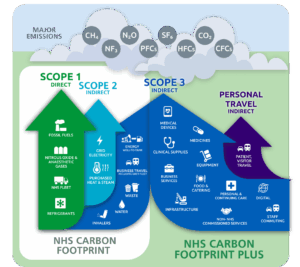Delivering a net zero NHS
Climate change poses a major risk to health and wellbeing, as well as a significant service delivery and financial threat to the NHS, impacting both infrastructure and services for patients.
 In 2020 the NHS became the world’s first health system to commit to reaching net zero and take action to reduce the future impacts of climate change.
In 2020 the NHS became the world’s first health system to commit to reaching net zero and take action to reduce the future impacts of climate change.
The Delivering a net zero NHS strategy set 2 targets against a 1990 baseline:
- Net zero by 2040 for the emissions the NHS controls directly (the NHS Carbon Footprint), with an 80% reduction by 2028 to 2032.
- Net zero by 2045 for the emissions the NHS can influence (the NHS Carbon Footprint Plus), with an ambition to reach an 80% reduction by 2036 to 2039.
Our progress report provides an overview of the NHS’s work over the last 5 years; an updated baseline for emissions based on improved data and methodological approaches; and considers next steps required to deliver a net zero NHS.
The reports demonstrate that the NHS’ actions to improve patient care and deliver financial savings, while reducing emissions, have been successful. Direct emissions are down 68% since 1990 and 14% in the last five years. We’re on track to reach our 2032 and 2040 goals.
This progress towards net zero, as the report details, clearly demonstrates the ways in which the NHS is supporting the government’s 3 priorities through initiatives that save money, improve health, drive growth and build a more sustainable healthcare service.
